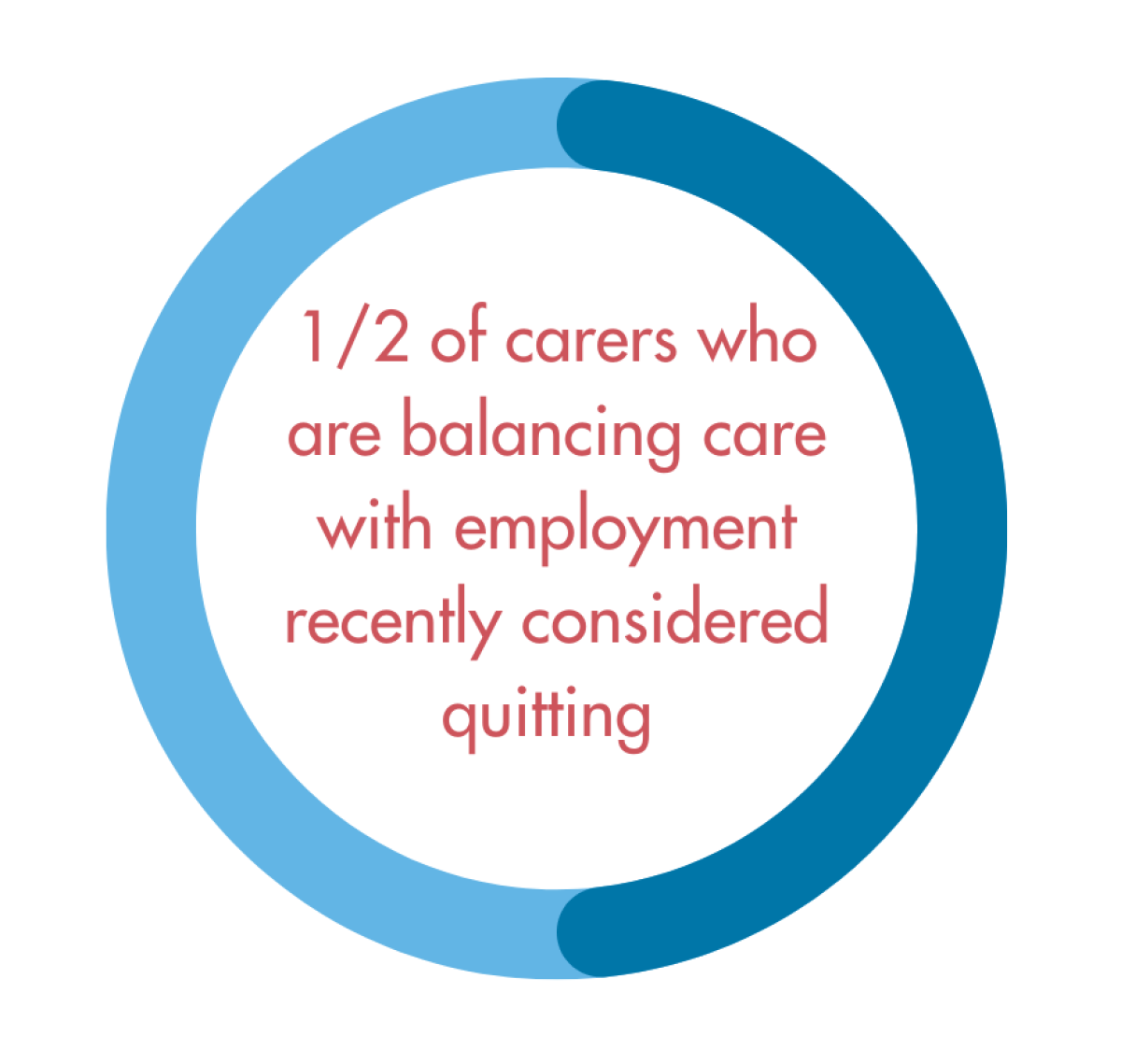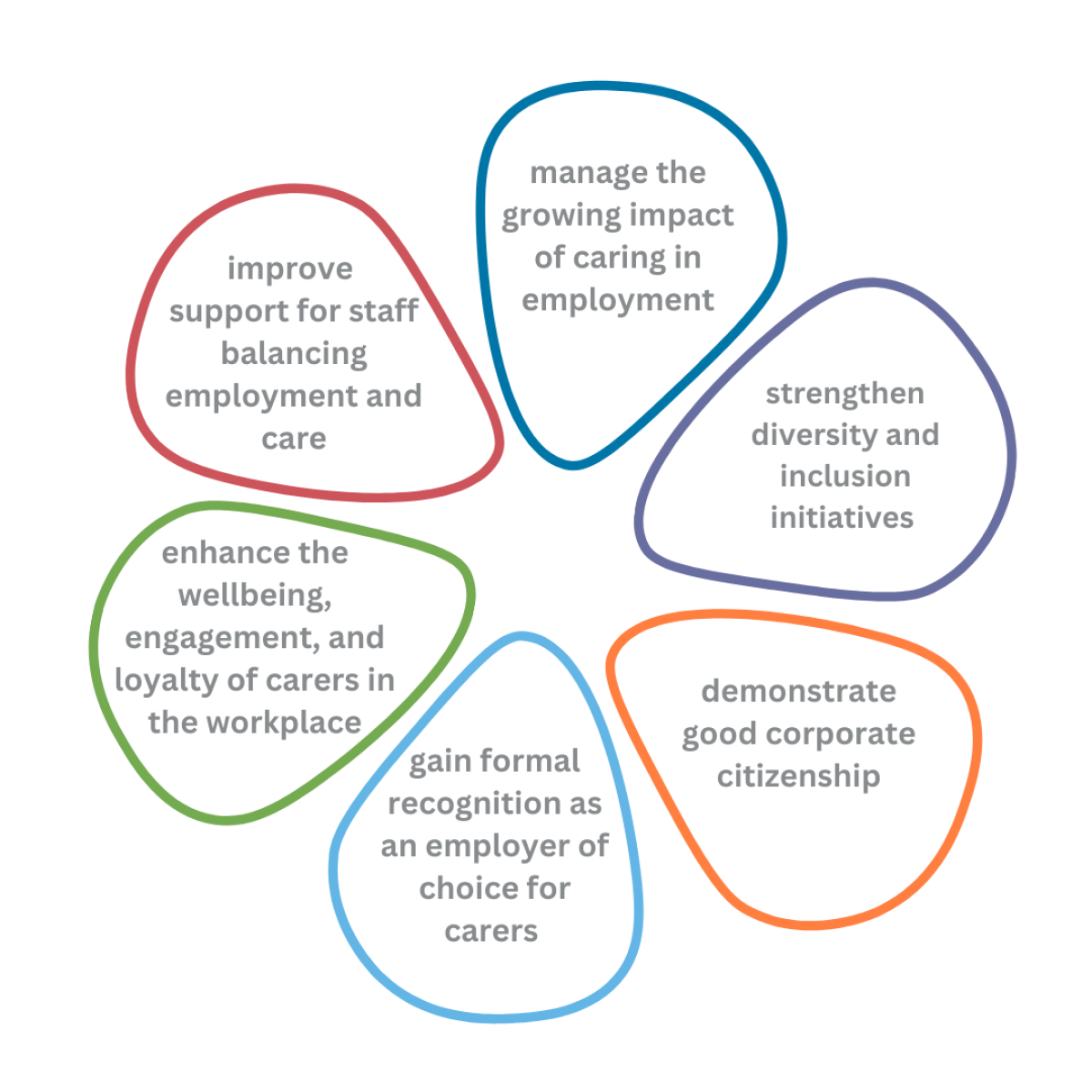For employers
A carer is any individual who provides care and support to a family member or friend who lives with a disability, mental illness, alcohol or drug dependency, chronic condition, terminal illness or who is frail due to age.
The information on this page is aimed at educating employers on who carers are and their place in employment. This page will provide employers with information and resources to understand the role they have in contributing and accommodating to carers in their workplace. The resources and information available will be useful if you are an employer and are looking for information about carers in employment, how to create a carer friendly workplace and/or are interested in becoming a carer accredited employer.

1 in 9 Australians are carers1
and the number of carers is expected to increase in the next 30 years. What does this mean for your workplace? Caring will affect every one of your employees at some stage. They are either caring now, will care for someone in the future, or will need care themselves. Supporting carers in the workplace works for everyone.

Carers who balance care with employment can face significant challenges. The 2022 National Carer Survey found that 1 in 2 carers balancing care with employment had recently considered quitting.

Creating a carer-friendly workplace is a good employment practice and makes excellent business sense. Research shows that carer-friendly workplaces benefit from:
- improved staff retention
- reduced recruitment and training costs
- reduced stress, sick leave, and absenteeism
- improved staff morale and engagement
- increased productivity².
Reputation as a carer-friendly employer will also improve your organisations' ability to attract talent and become an employer of choice.
Carers + Employers program
The Carers + Employers program defines best practice standards for supporting staff with caring responsibilities. This may be any employee within your organisation who provides informal support or care to a family member or friend who is living with a disability, mental illness, drug and/or alcohol dependency, chronic condition or is frail and aged.
The program helps employers understand their carer workforce, increase carer awareness and recognition, promote flexible employment practices, implement inclusive policies, and offer practical workplace support.
About accreditation
The Carers + Employers accreditation program is a tiered framework which is both robust, yet flexible enough to suit diverse workplaces. Accreditation is offered at three levels: organisations start at Level 1 ‘Activate’ and can work their way to Level 2 ‘Commit’ and finally Level 3 ‘Excel’. This enables employers to build from an initial level of support for carers in their workplace, to embedding innovative strategies across the organisation.


Support and guidance are provided to you throughout the accreditation process, including annual training and consultation. Carers + Employers also brings together employers interested in sharing ideas and finding ways to develop workplaces that are supportive and inclusive of carers. Find out more about the Carers + Employers program via the link below.
Video resources
Fact sheets
The Carer-Inclusive Workplace Initiative
The Carer-Inclusive Workplace Initiative (CIWI), led by Carers Australia, emerged as a result of recommendations from the Australian Government’s Jobs and Skills Summit with the aim to promote equal opportunities and reduce barriers to employment for carers.
CIWI offers a self-assessment to help employers evaluate their current inclusivity practices and identify areas for improvement.
CIWI is designed to be a first step in exploring carer inclusivity in the workplace. Organisations wishing to take further steps towards improving their carer inclusivity are encouraged to initiate accreditation through the Carers + Employers program led by Carers NSW.
Carers’ rights in the workplace
Did you know that carers have a number of rights in the workplace? The resources below outline these rights and your responsibility as an employer.
Fair Work Commission resources
Click the links below to find out more about carer rights and responsibilities around flexible employment arrangements, carers leave, and discrimination or harassment.

Carer inclusive recruitment
Carers often have a number of unique skills and strengths relevant to the workplace as a result of their caring role. If your company would like to tap into the carer talent in your industry, you may be interested in partnering with Carers NSW on the following projects.
Career Pathways for Carers (CP4C) Project
Career Pathways for Carers (CP4C) is a two-year project proudly funded by the NSW Government that will support women carers to overcome enduring and complex barriers to entering or re-entering employment.
The project, delivered with a grant from Women NSW under the Return to Work Pathways Program, provides person-centred career guidance and support to assist women carers identify, work towards and obtain paid employment in roles and industries that align with their skills and interests.
Find out more about the Career Pathways for Carers project below.

For employers and recruiters who are looking to enquire about the CP4C project please contact michaelm@carersnsw.org.au
Aged Care Workforce Project
Carers NSW is working with a number of partners to assist aged care service providers to offer employment pathways for family and friend carers.
The following resources have been developed as part of the Aged Care Workforce Project to help employers understand the transferability and employability of carers’ skills and interests.
Connect with us

For more information or support, get in touch with Carers NSW.
1Australian Bureau of Statistics (2018) Survey of Disability, Ageing and Carers.
²Supporting Working Carers: The Benefits to Families, Business and the Economy, Final Report of the Carers in Employment Task and Finish Group, HM Government, Employers for Carers and Carers UK (2013). Evidence was based on research with 200+ employers in the UK.



